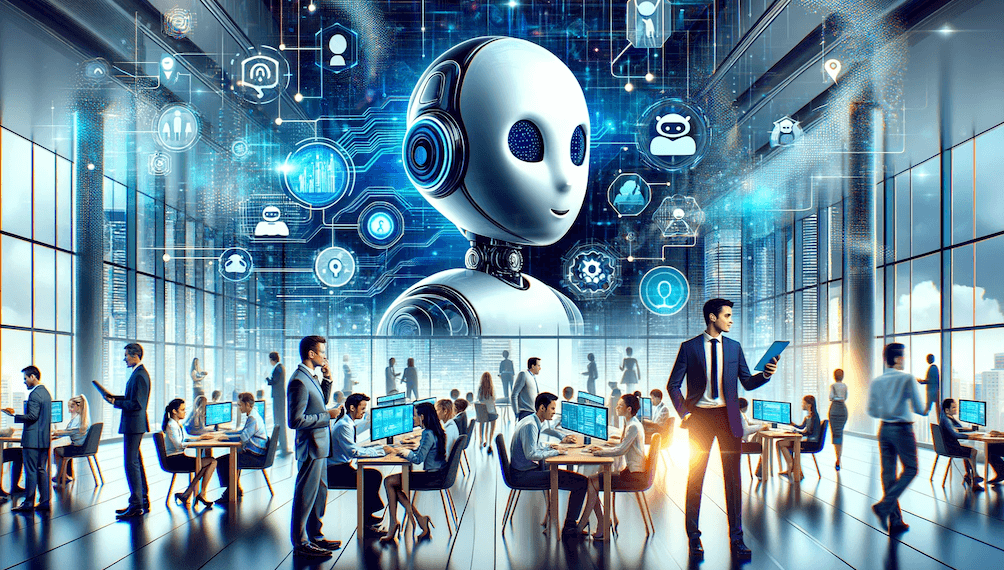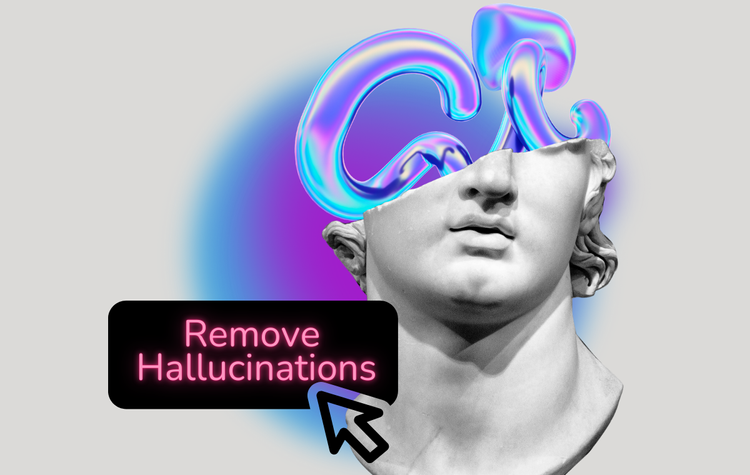How to Evaluate Enterprise Chatbot Solutions
Enterprise chatbot solutions can revolutionize your customer service. We discuss 18 tips for evaluating enterprise chatbots. Gleen AI stands out as a leader among enterprise chatbot vendors, especially when considering the ability to eliminate hallucination.

Introduction
Enterprise chatbots have emerged as a crucial tool in serving both customers and employees. They automate interactions and bring a new level of service to businesses.
This article takes an in-depth look at enterprise chatbot solutions. We'll explore the importance and key benefits of enterprise chatbot solutions. We'll also discuss some of the key criteria you should use in evaluating enterprise AI chatbot solutions.
What are Enterprise Chatbots?
Enterprise chatbots are advanced AI tools. They automatically handle customer and employee interactions in a business environment.
New enterprise AI powered chatbots are significantly different from older chatbots.
Older enterprise chatbots use decision trees and rules. These older chatbots are extremely difficult to set-up and maintain. In addition, they create inflexible user experiences and often frustrate users.
Newer enterprise chatbots use artificial intelligence to have conversations with customers and employees. They can understand complex questions and create highly relevant answers. They can also integrate with various business systems and enable self-service.
Chatbots are more than just a temporary fad. They are essential in providing efficient, round-the-clock customer service. This technology has become a game-changer in the way businesses interact with customers and employees.
In this guide, we will cover several important topics:
- The nature of enterprise chatbots and how they work.
- The benefits these chatbots bring to enterprises.
- The key features you should look for in a best-of-class enterprise chatbot solution.
Understanding Enterprise Chatbots
An enterprise chatbot is a type of AI software used in businesses.
Two types of enterprise chatbots exist:
- Customer Service Chatbots: These chatbots converse with customers. They answer questions, provide information about products, and solve common problems. This helps make customers happier by serving them faster. They also improve the efficiency of customer service teams and allow them to focus on more complex escalations.
- Internal Support Chatbots: Companies use these chatbots internally, with employees. They help employees by answering questions about HR, giving IT support, and making internal work easier. A specialized type of internal support chatbot might help software developers write code.
The biggest differences between an enterprise chatbot solution and a public chatbot like ChatGPT are:
- Enterprise chatbot solutions train on company-specific information. Conversely, ChatGPT trains on the entire public internet of text.
- As a result of this training, enterprise chatbot solutions specialize in answering company-specific questions from employees and customers. Conversely, ChatGPT can answer or respond to any random question. (ChatGPT can't answer questions that require knowledge of proprietary data.)
- Employees and customers typically use enterprise chatbot solutions. Conversely, anyone on the internet can use ChatGPT.
- Employees and customers expect enterprise chatbot solutions to use company information to provide highly accurate answers. Conversely, ChatGPT hallucinates -- it can make up answers that have no basis in fact.
- Enterprises integrate enterprise chatbots with existing enterprise systems, like their help desk, their CRM, and the order management systems. This enables employees and customers to access more enterprise data and self-serve. Enterprises typically do not integrate ChatGPT with any enterprise system.
A Note on GPTs
In November of 2023, Open AI introduced custom GPTs, or GPTs for short. Companies can upload proprietary files to GPTs, integrate GPTs with APIs, and privately share GPTs to co-workers.
At first blush, it might seem that GPTs could be viable enterprise chatbot solutions. GPTs, however, have the following limitations:
- The amount of data you can upload to a GPT is extremely limited.
- GPTs can't automatically update their own knowledge.
- Bad actors can hack into GPTs, and GPTs can leak proprietary data.
- Open AI doesn't provide a way to review either the questions asked of a GPT, or the GPT's responses.
- GPTs hallucinate. We trained Gleen AI and a GPT on the same knowledge. The GPT hallucinates, but Gleen AI doesn't hallucinate. Watch the video below:
Given these severe limitations, companies needing enterprise-grade chatbot solutions should not consider GPTs.
Benefits of Enterprise Chatbots
Enterprise chatbot solutions bring numerous benefits to businesses. Here's a breakdown of those benefits:
- Higher User Satisfaction: Chatbots typically improve time to first response and time to resolution. They also offer personalized assistance and more empathy. All these factors result in improved customer or employee satisfaction.
- 24/7/365 Service: Enterprise chatbots are always available, providing constant support.
- Increased Efficiency: Enterprise chatbots automate routine tasks, saving time and resources.
- Higher Productivity: Chatbots can help customer service teams serve more customers, or internal help desks service more employees. They also allow teams to focus on more complex escalations.
- Data Insights: Chatbots can gather valuable customer data to inform business decisions.
- Scalability: Enterprise chatbots can easily adapt to spikes in customer support volumes.
Key Evaluation Criteria for Enterprise Chatbot Solutions
When evaluating enterprise chatbot solutions, you should consider these essential features:
- Generative AI: Generative AI enables the chatbot to understand complex questions and provide accurate, relevant responses. It can also translate into multiple languages, making it versatile for global enterprises. If the enterprise chatbot doesn't use generative AI, you should think twice.
- Proprietary Data Upload: A robust enterprise chatbot uses your company's specific data, not just general internet knowledge. This dramatically improves the relevance of the chatbot's responses for your enterprise.
- Factually Accurate: The chatbot should provide answers based on the enterprise's knowledge, avoiding any made-up facts. In other words, the chatbot shouldn't hallucinate.
- Security & Privacy: The chatbot vendor should comply with SOC 2 Type 2 standards. The chatbot mustn't use your data for any other purpose. In addition, the chatbot should keep your proprietary data and queries entered into it secure and private.
- Observability: You should be able to monitor all interactions with the chatbot. This includes tracking both the queries and the responses.
- Continuous Improvement: The chatbot should evolve by learning from user feedback. This ensures that it remains effective and relevant over time.
- Low Maintenance: The chatbot should automatically update its knowledge base. This keeps its information accurate and current.
- Integration: The chatbot should integrate easily with your existing systems, like your help desk, CRM, and order management system.
- Actionable Responses: Beyond answering questions, the chatbot should enable users to complete tasks and self-serve.
- Multiple Versions: The chatbot solution should allow you to create different chatbot versions for various needs across your enterprise.
- LLM Agnostic: The chatbot should work with any Large Language Model (LLM).
- Compatibility with the three major public clouds: You can host the chatbot solution on AWS, Azure, or Google Cloud.
- Single Tenancy: To ensure data security, the chatbot should run on a stand-alone application and database. This ensures that the software is operating solely for your enterprise and cannot intermingle data with other customers.
- Dedicated Host: You can elect to host the chatbot on a dedicated host/machine, to avoid noisy neighbor problems.
- Virtual Private Connection: You can have a Virtual Private Connection between the chatbot solution and your Virtual Private Cloud. This ensures secure data transfer between you and the chatbot.
- Scalability: The chatbot should be able to handle increasing volumes of interactions as your business grows.
- Uptime SLAs: The vendor should guarantee a certain level of service availability.
- Customer Service SLAs: There should be specific service level agreements for customer service response times.
Conclusion
In summary, enterprise chatbots represent a significant advancement in business technology. They are AI-driven tools designed to enhance customer interactions and streamline internal processes.
Gleen AI stands out as a leading option in enterprise chatbot solutions. Gleen AI meets all the above requirements for a great AI chatbot for businesses, and is a market leader in no-hallucination enterprise chatbots.
To experience the benefits of no-hallucination enterprise chatbots, get a demo of Gleen AI, or create a free, custom GenAI enterprise chatbot with Gleen AI today.



